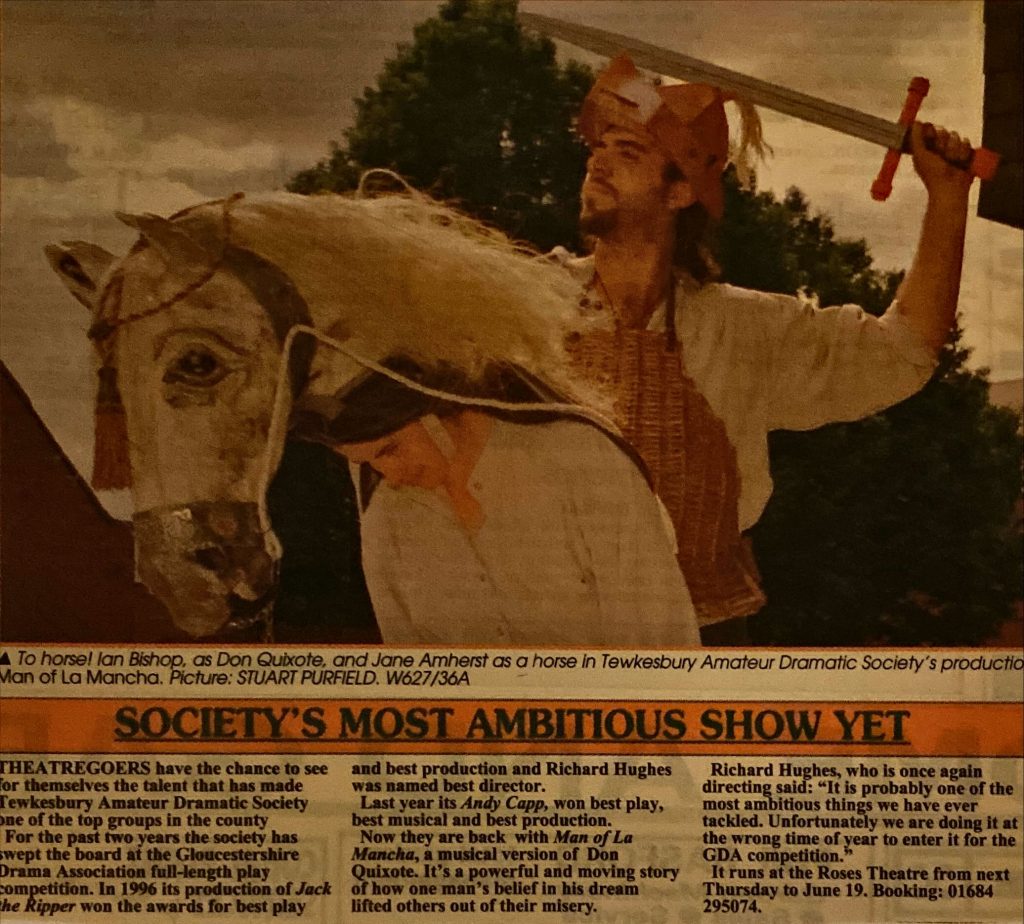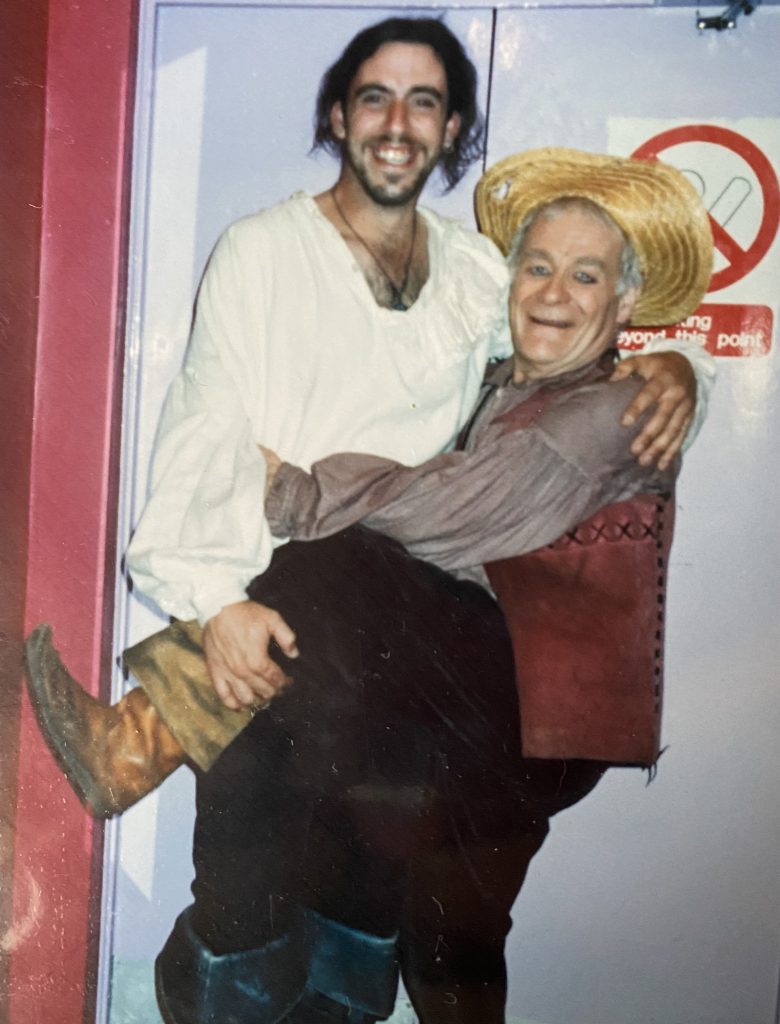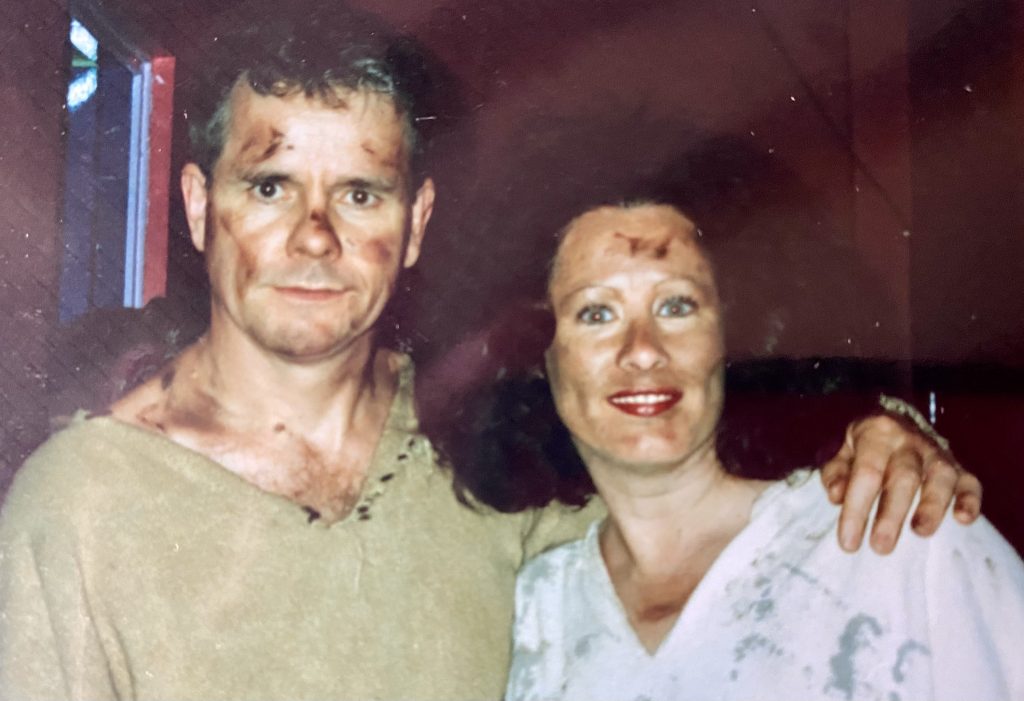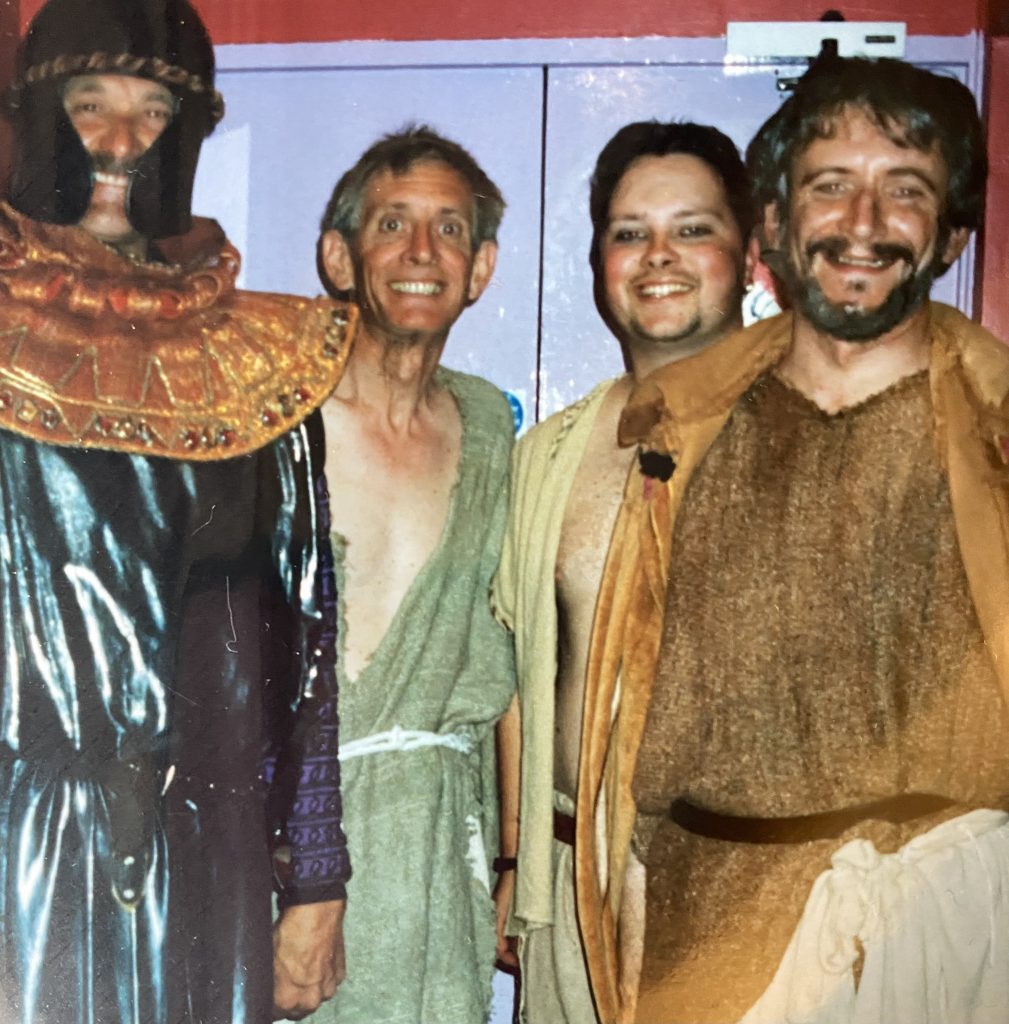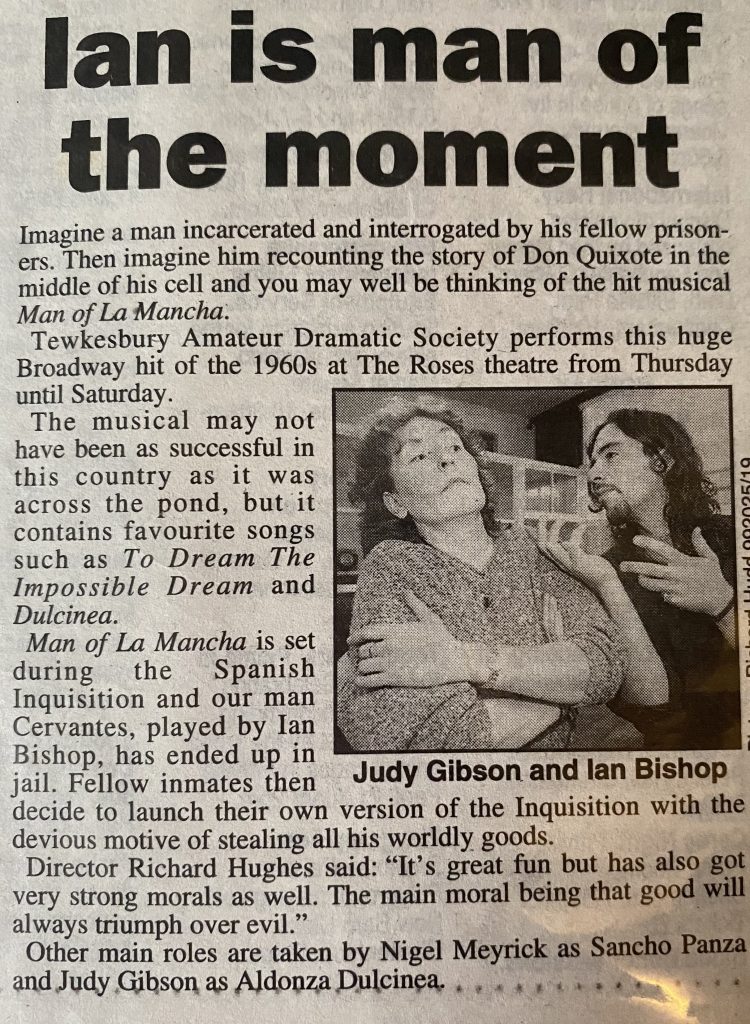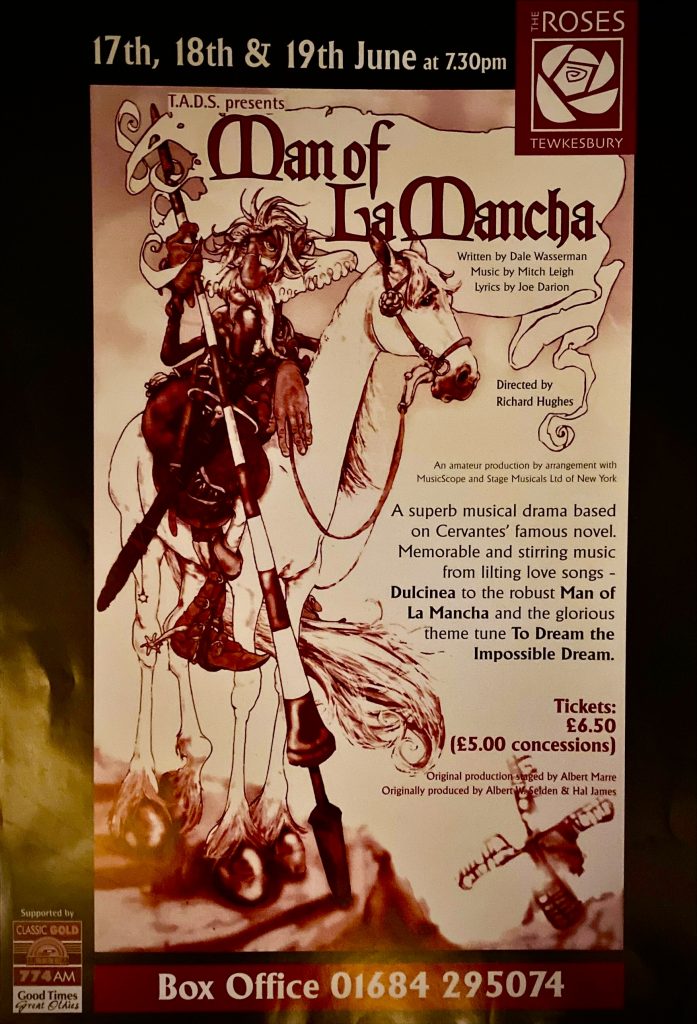
Man of La Mancha is a 1965 musical with a book by Dale Wasserman, music by Mitch Leigh, and lyrics by Joe Darion. This musical play tells the story of Migues de Cervantes, how he gets thrown into prison, and how he relates his story of “Don Quixote”.
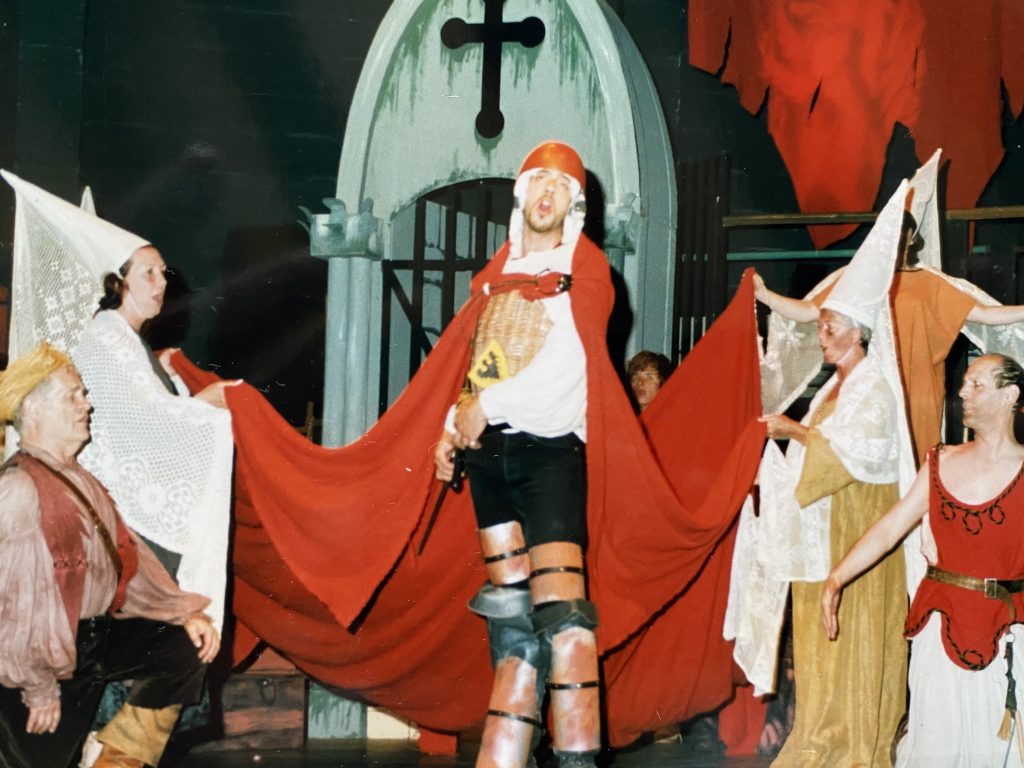
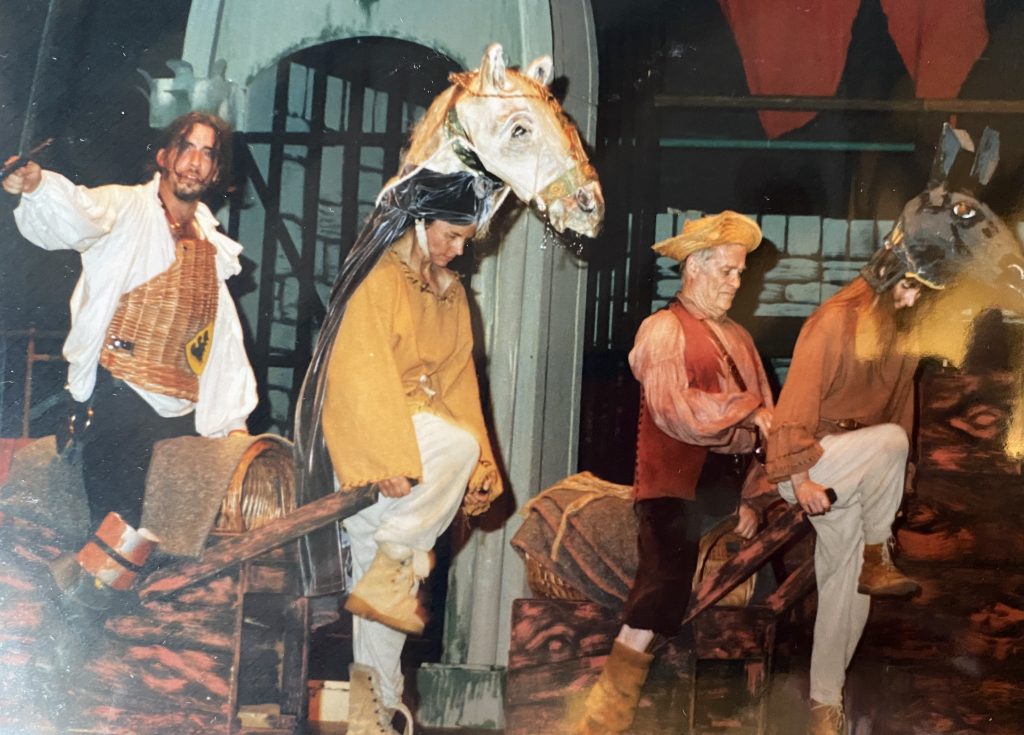
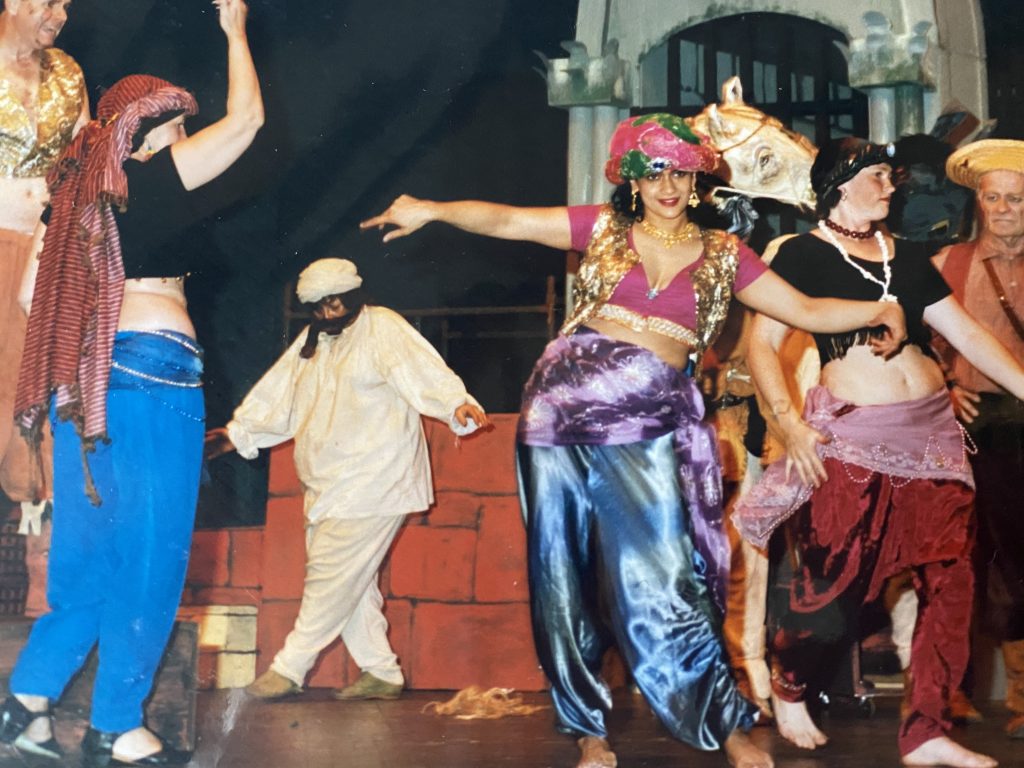
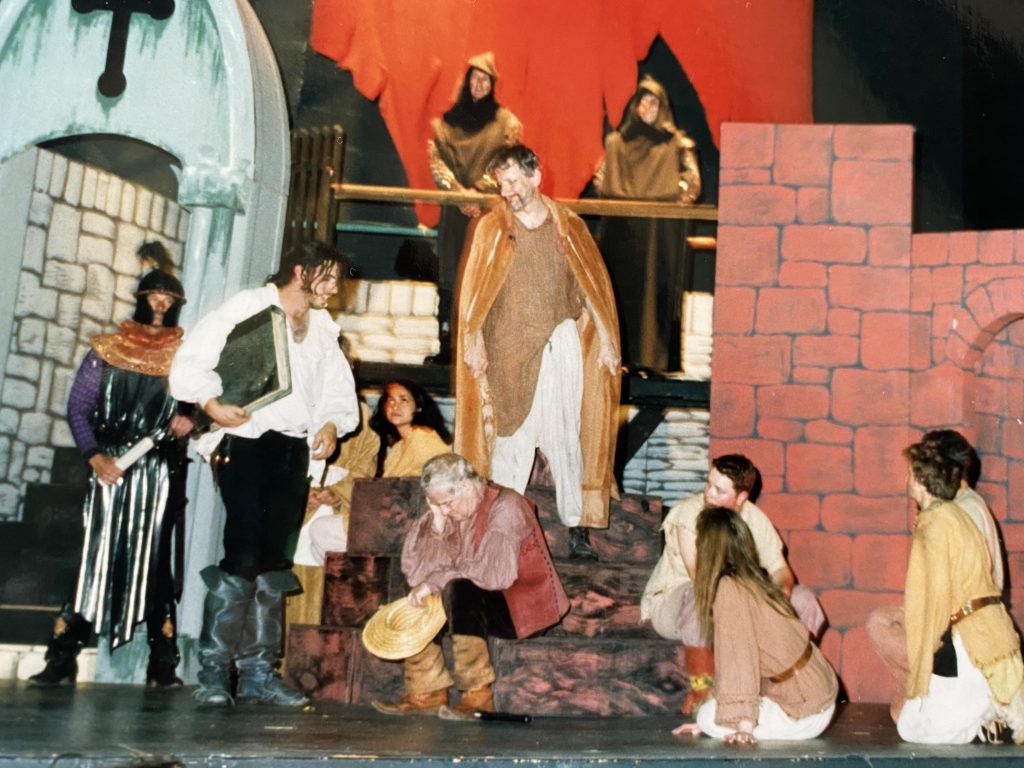
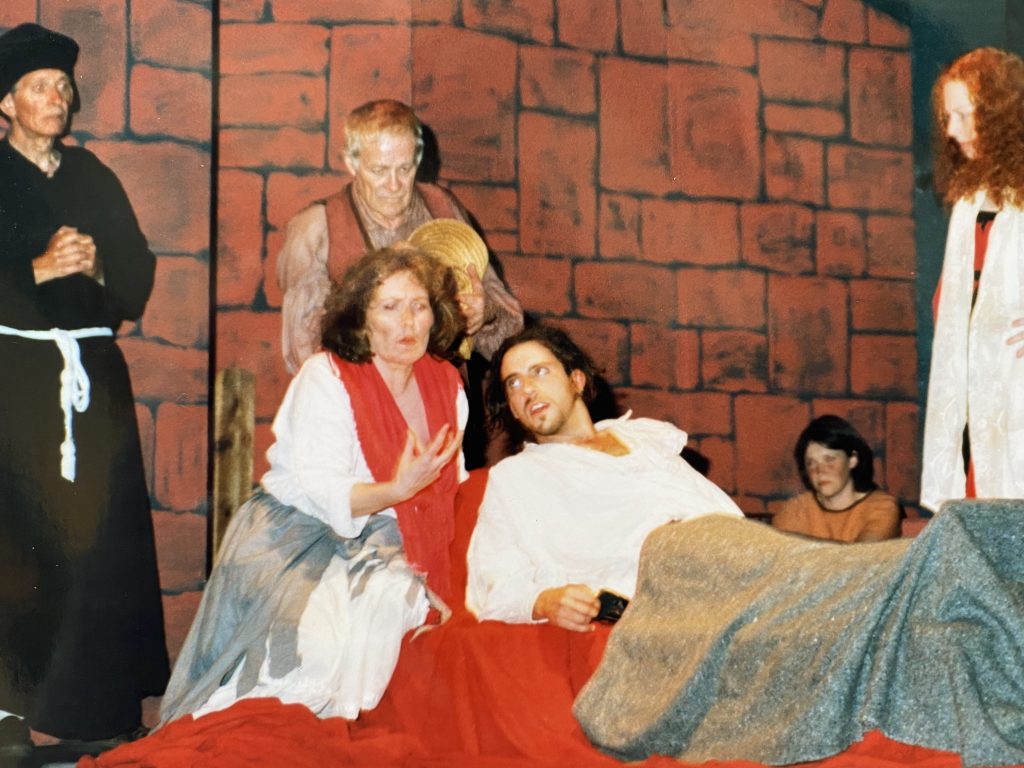
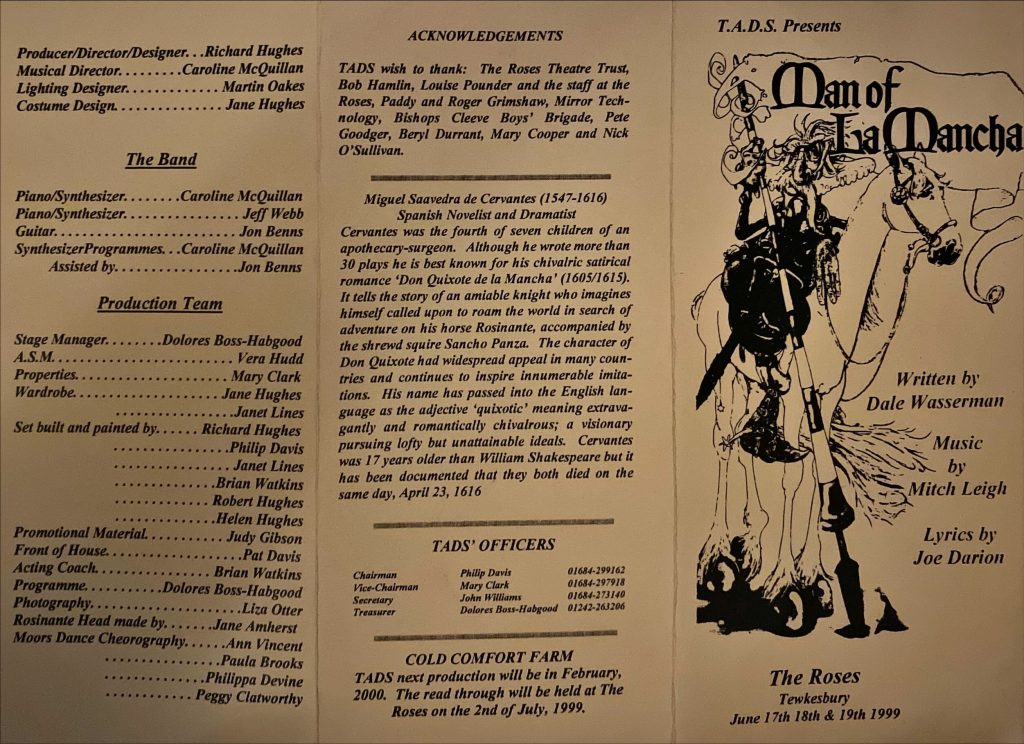
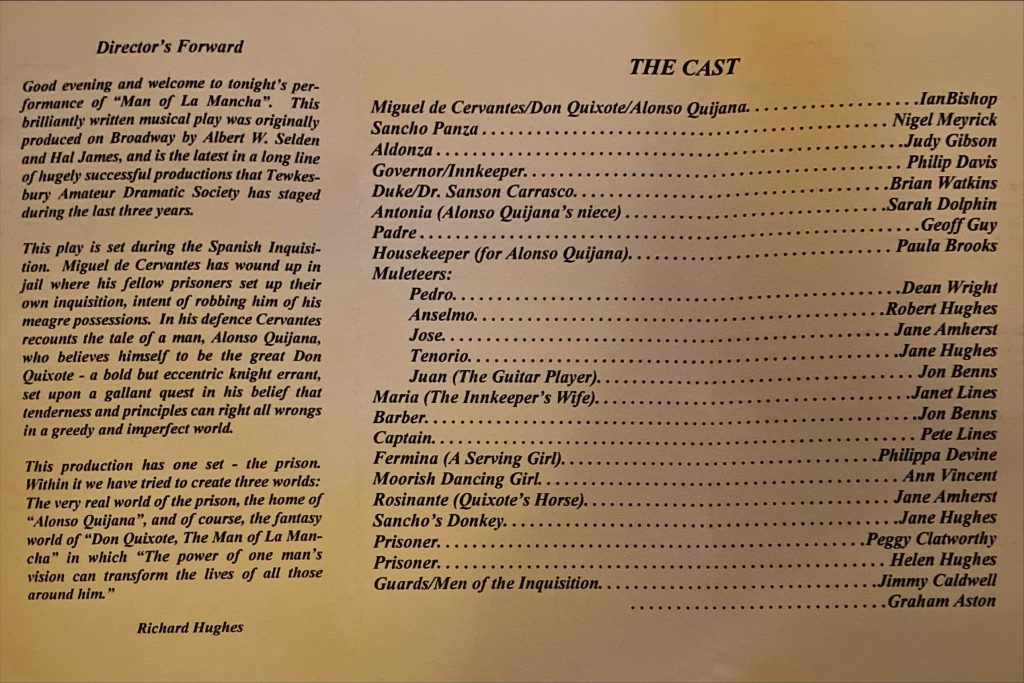
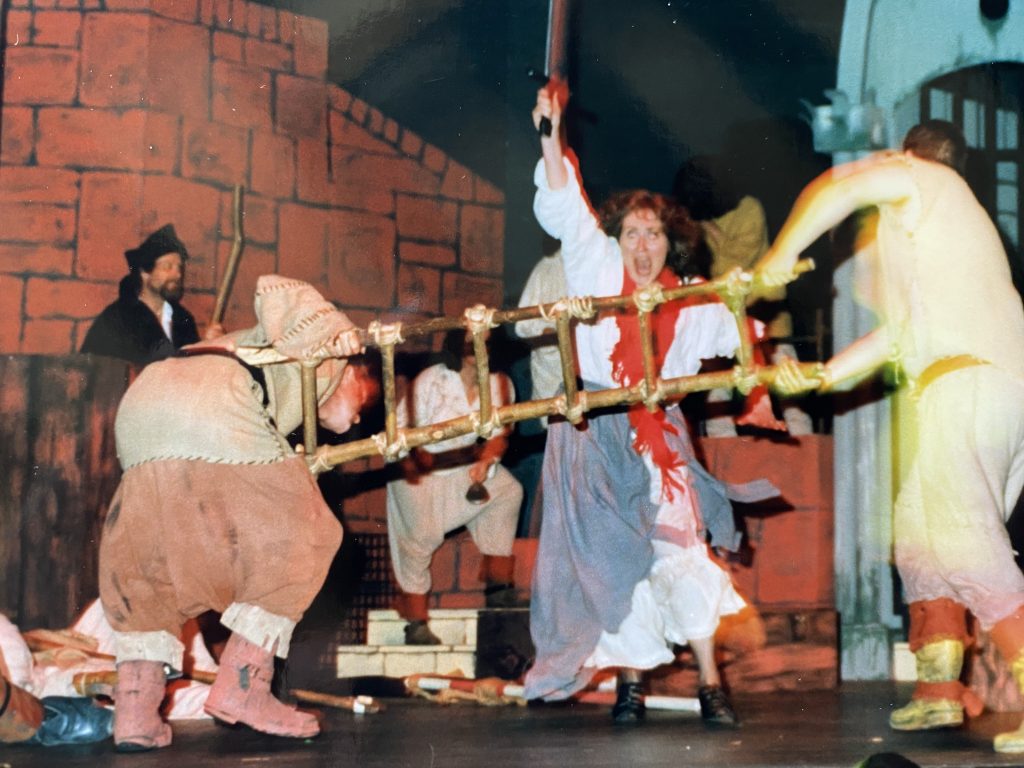

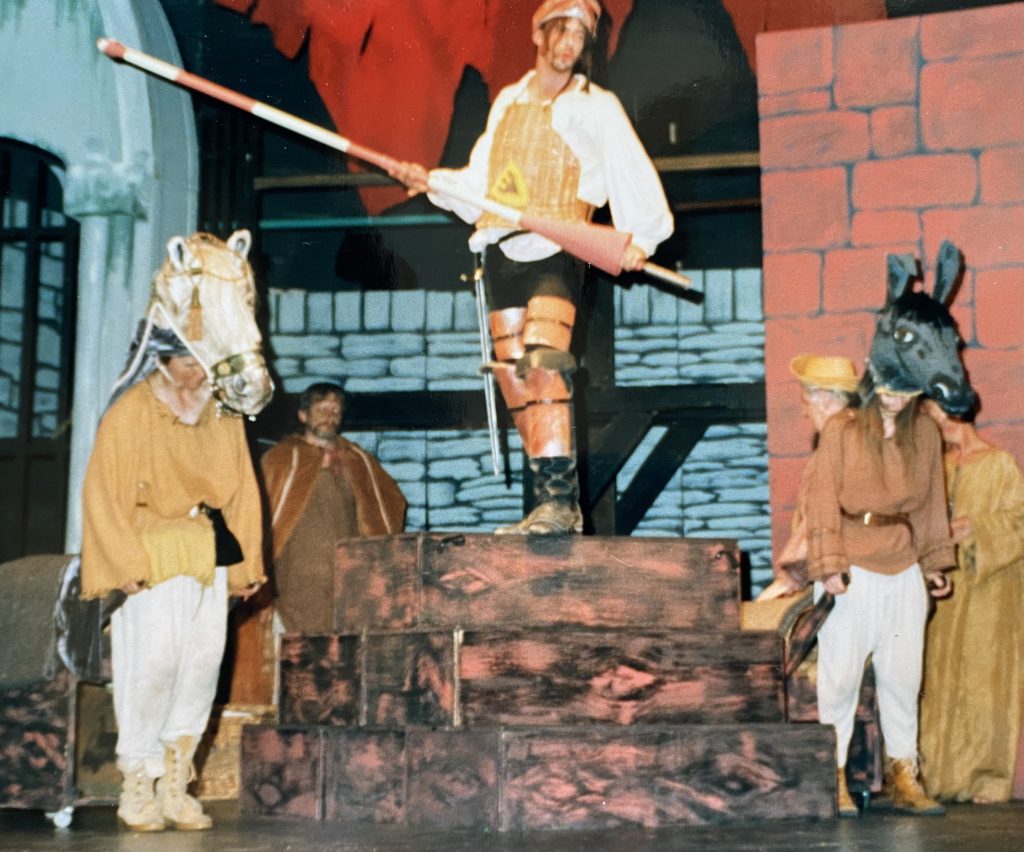
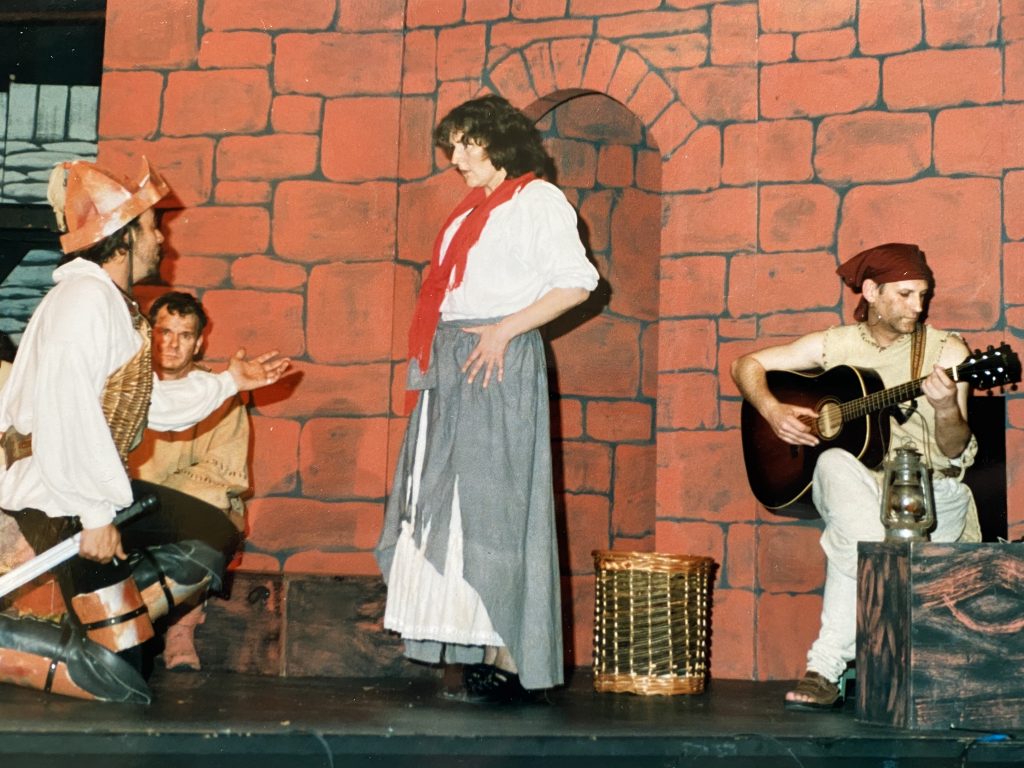
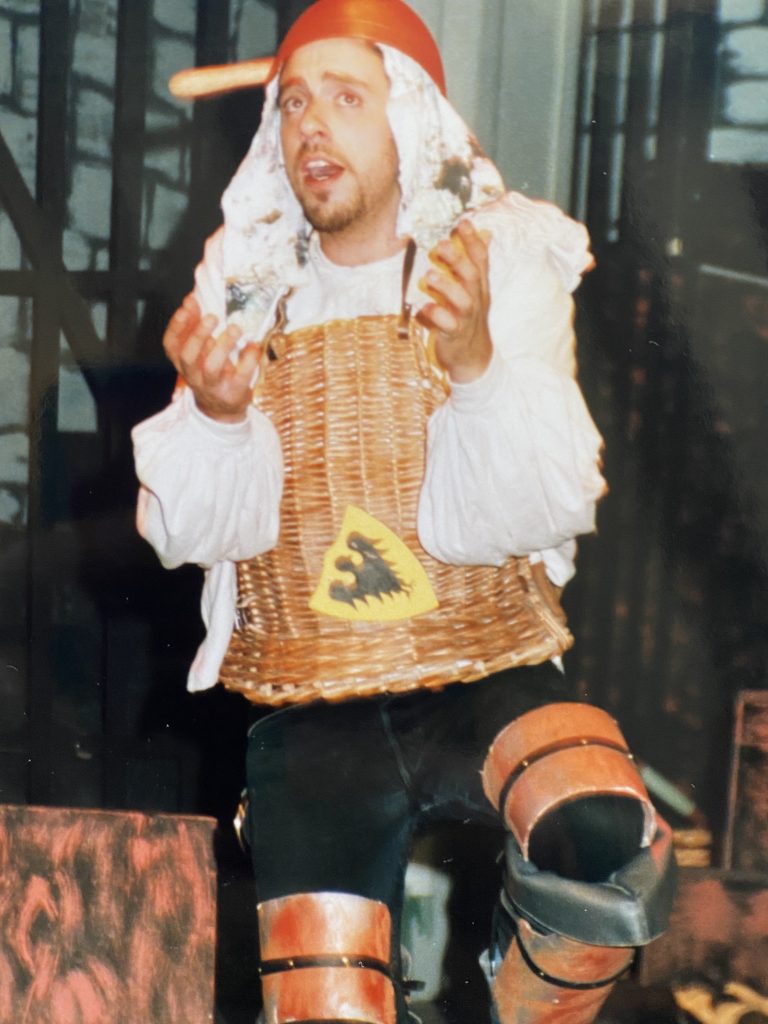

Although this production was not entered into any play competition, TADS requested a GDA adjudication:
When I was asked to react to this performance, I threw caution to the wind to a certain degree. After all I live in Tewksbury, teach Drama here, past students are in this production, I attend performances at the theatre as regularly as I am able and after this piece may have to field counter reactions should my response prove unfavourable.
So why agree? Well my reasons include the immense pleasure I had adjudicating the full length play competition for Gloucester Drama Association a while ago, the response my good friend Dora Brooking had to a previous production mounted by TADS in the same competition and possibly the most persuasive reason was my prior experience of this show
As a mere child (!) I travelled to the West End to see what I believe to be the first British cast version with Keith Michell as the central role, further interest being derived in that the role of Sancho Panza was taken by the father of a fellow pupil at the school I attended, Bernard Spear. Needless to say in the situation I now find myself, I loved the show, and certain images have haunted me ever since. Oh the power of good theatre!
Also, ironically, just prior to your request of me I bought a wonderful CD of the show sung in French by the incomparable Jacques Brel, including a heartbreaking version of “La Quest’. As a result of all this how could I refuse even though I herein acknowledge the difficulties and prior experience baggage I bring to the exercise. I trust the cast and all those involved in this production will receive it as an informed response but necessarily an individual one.
Sitting in the Roses, I found there was a very satisfying, expectant atmosphere. You were well served with a near capacity audience that was a testament to both good publicity and your positive reputation in the area. My own anticipation was accompanied by a note of caution as my clear recollection of the opening scene of this play was of an amazing coup de theatre as a long panel in the centre of the back wall lowered onto the darkened empty stage, becoming a high staircase by which Cervantes, Panza and the guards descended to the stage even as it moved into place. All this accompanied by a breathtaking brass fanfare. As the Roses curtain opened it revealed a fair attempt at this effect. A shaft of light pierced the stage darkness as the entrance party emerged stage left on a gantry at stage head height before descending a short flight of stairs and unlocking a central gate with more than satisfactory pomp, to a suitably strident soundtrack. The costumes of these characters were excellent, with the neutrally coloured detainees demonstrably no match for the wonderfully metallic guard, a fine example of a costume concept that successfully underscores themes and character status within the play. Indeed the costumes were an outstanding feature of the whole production
Unfortunately I was less convinced by the set design. The intention to represent the three realities of prison, Quijana and Quixote missed the wonderful opportunity this show offers in allowing the audience to collude in the suspension of disbelief. The ‘real’ world is that of the prison and I felt that was compromised by the inclusion of locations that would feature later in the play cluttering the stage picture. Also the inclusion of exits dilutes the impression of incarceration and in theatrical terms reduces the ensemble nature of the piece which is emphasised in the implied presence of the cast throughout. The setting appeared sturdy and well constructed, but I believe the power of the first scene has most to do with the skill that Cervantes brings to the creation of his imaginary world for the prisoner audience and by extension the theatre audience. Maybe the emptiness of the bare stage might appear rather dour and lacking in stage interest, but is not this exactly the point that underpins the play for does not Cervantes create a world for his parallel audience in just such adversity. Perhaps a bare stage with upstage gantry and false, imposing back wall would suffice but this may require some defusing of audience expectation by leaving the curtain open as they arrive. I did like the moveable blocks that provided interesting levels and afforded a flexibility of use. The requirement for discreet locations of action was well served by their use. Particularly impressive was the creation of Quijana’s sick bed, which was a most satisfying piece of practical action. If this had been adopted as the consistently applied design style how impressive your show would have been.
The acting was never less than good throughout with a number of fine moments and characterisations. All seemed committed to and focused upon their respective places in the action but in spite of the clear ensemble credentials of this play one role dominates aboveall others and in Ian Bishop you had an actor with both a pleasant, sweet singing voice and a sensitivity to situation and dialogue. He was however too young or more accurately the part was played and appeared too young. Perhaps Cervantes could have been played at a youngish age with some dramatic licence but the central situations of Alonso Quijana and Don Quixote are altered immeasurably by a youthful presence. Our sympathies are more securely exploited when his apparent madness is in the context of an incipient senility, as are his advances upon the much younger Aldonza whose perception is partially prescribed in the early scenes by a rational incredulity informed by her dealing with another exploiter.
Also the relationship with a similarly aged Sancho Panza, his loyal retainer, makes for more poignancy. This need not have proved a problem for you as there is that splendid early scene when Cervantes begins to provide his defence and he becomes Quijana in front of the prisoners’ eyes and therefore the theatre audience’s. Here is an opportunity for him and you to show the gradual stage metamorphosis to the new persona through the creation of a contrasting characterisation supported by make up and wig taken from his stage trunk. This older Quixote scores in sympathy as an elderly Grandfather figure losing his marbles, makes the exploitation by his household more abhorrent, makes more sense of the situations within which he finds himself and ultimately renders his death as sad not tragic. There is also the potential theatrical power of the inquisition jolting him back to reality and the pathos of the drained Cervantes receiving the endorsement of the prisoners, together with the return of his property, whilst removing the elements of stage art that made him Quijana. There was much to commend in Ian’s performance that made him a credible protagonist for the action, He had an excellent ear for the dialogue, listening well to his co-performers and he attacked the songs with some relish and fine musicality. He clearly has a talent ripe for development.
Nigel Meyrick’s Sancho Panza was a constant delight. Right from his first entrance there was the simple loyalty of the honest, humble retainer. His focus throughout was admirable, his grasp on the relationship between the level of sentiment and of humour he was able to bring to the performance very sure. His contrapuntal singing on the title song was exemplary, and his comic timing of the ‘missive’ excellent, although I felt there was one slight lapse when he feigned a trip in Music Hall manner on his exit from this scene which I thought a cheap device beneath the quiet dignity he otherwise brought to the play.
There was much to admire in Judy Gibson’s portrayal of the patsy Aldonza. She managed to make a credible distinction between the self that is necessary to survive her bestial treatment at the inn and the contrived innocence of Quixote’s Dulcinea. She put me in mind of Dietricht’s Destry’ but not in any negative sense, it was probably the accent. Her command of the stage was very good and she could ‘put over’ a song with maximum coherence. There were moments when she appeared less secure however for example the rape scene where a mixture of raunch and coyness suggested a little more rehearsal would have better represented your intentions and there were also two scenes where she seemed responsible for slowing the pace, the ‘missive scene including the song and the duologue scene with Quixote in Act Two. These slight reservations only serve to throw into relief this otherwise fine performance. One final thought, why did no-one else share her accent?
Philip Davis gave the Innkeeper a lovely seedy spin, obviously relishing his opportunity to create this rogue grotesque through hangdog posture, whining tones and fine comic timing. Although he was less impressive as the authoritative leader of the prisoners he was certainly more than adequate, with nigh on perfect timing as he returned the book to Cervantes. Janet Lines had relatively little to do as the Innkeeper’s wife but impressed none the less,
Sarah Dolphin’s Grand Guignol acting suggested a depth the part did not allow her the space to explore and similarly Paula Brooks was more than secure as the Housekeeper, the repeated “Woes” during “I’m only thinking of him’ from these last two was a particularly fine moment. Brian Watkins had a good hold on the character of Carrasco, evincing some menace as required. His posture did not always match his vocal delivery though and the Enchanter lacked the necessary dominance on his entrance. I was also disappointed that some thought was not given to his voice at this point for the revalation on the lifting of his visor was lost as his voice had been too distinctively his own. Here was an opportunity to experience this moment from the Quixote perspective, a view supported by the lighting you used, perhaps by sonically enhancing Brian’s voice during the first part of the scene.
I thought that Geoff Guy’s Padre was a cameo of real potency, a chorus like religious grotesque with huge presence. He brought an impressive passion to the part, singing with accuracy yet retaining character. He drew attention to himself, not in a vulgar upstaging sense, but through his intensity of focus. He looked and sounded so right in this fine performance. Jon Benns also retained an impressive balance between the musical and the dramatic requirements of his involvement as Jean. His Barber managed to stay just short of pantomimic, with some nice comic delivery. There were creditable moments from a number of the rest but they so often worked as a team that singling them out may be churlish, however I enjoyed Dean Wright’s thuggish Pedro and Robert Hughes’s castrato Moor, surely a Boyband career beckons!
The set pieces almost worked, with lots of invention in the fight scene that needed to be just a little slicker, also the rape scene was just a little hesitant, in fact the yobs could have done with a little more coarseness in their demeanour generally. The props served the play nicely and I particularly liked the shield mirror that gave a lovely stage illusion of Quixote’s distorted world. The equine heads were excellent and the occupants are to be congratulated on conveying appropriate characters in their manipulation of them. I was not as impressed with the wheeled torsos, although they seemed like a good idea in theory but they reduced the stature of their riders too much and weakened the stage power of the affirming songline, ‘I am I Don Quixote, the man of La Mancha. The lighting I found rather too busy, the positioning was fine but the constant changes less impressive. I would have prefered some reinforcement of the prison reality with torches, lanterns and/or firebrands on stage subtly amplified by stage lighting.
I must admit to the greatest admiration for Caroline McQuillan. She really supported the work on stage admirably. I would have preferred more power overall but this cannot be laid at her door. She deserves a fuller sound from the outstanding effort she expended, perhaps better speakers or what about a fuller band? A real valuable asset she is.
Finally I must return to the costumes for these were impressive throughout, combining ensemble considerations with group defined colour coding and ethnic requirements. Geoff Guy’s sacking gusset was one amongst many joys. A significant achievement. If I were to champion any one area of this production it would be for your coherent application of costume to the themes and characters of this show I hope that my response has resonance for you as much hard work has obviously gone into your preparation and you have done well with a difficult piece. At the end of the adjudication process the adjudicators would meet and discuss the relative merits of productions we had seen in order to derive winning entries, This performance would be the kind that would provide a benchmark of good quality that would only be beaten by entries of sustained excellence, and as such could have been a contender for an award TADS are clearly a group with the aspiration to improve and the talent to succeed.
Alan M. Hayes
